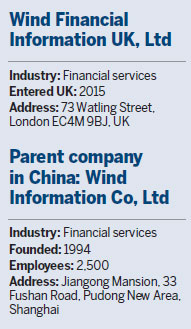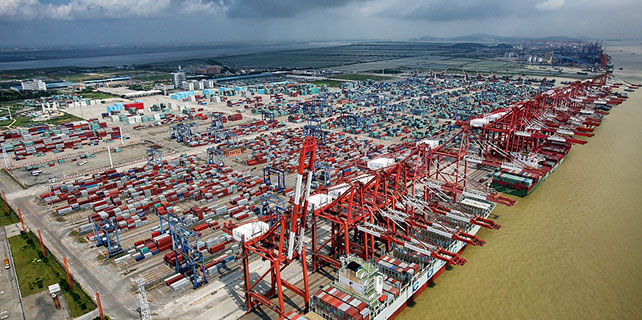Riding the Wind of change
Leading domestic provider of financial data aims to tie Europe business to Chinese coattails
China's financial market is rapidly reforming and opening up to the world. Chinese bonds are set to be included in the Bloomberg Barclays bond indices this year. And stocks are expected to be included in the US-based MSCI index soon.
In short, foreign investors will have more opportunities to buy into the China growth story.
Amid these unprecedented changes, Wind Information Co, China's leading data provider - known as the Chinese Bloomberg - has set up shop in the United Kingdom to sell its terminal to European investors.
|
A financial sector analyst in London looks up information on Wind Financial Information terminal. Cecily Liu / China Daily |
In China, Wind already serves more than 90 percent of financial institutions, from hedge funds and asset managers to regulatory bodies. A decade ago it established a Hong Kong office to serve international investors, and now its terminal is used by 70 percent of foreign investors with licenses to invest in China.
"For Wind, internationalization is an important strategy we must practice, due to the increasing opening-up of China's market to the international economy," says Thomas Zhang, the company's general manager for Europe.
As a newcomer in Europe having established a London office just last year, Wind has a long way to go if its ambition is to rival leading data providers such as Bloomberg and Reuters. But Zhang says what makes Wind unique is its expansive collection of data relating to China and other Asian countries' financial markets and specific products.
The news of Wind's UK expansion has so far been welcomed by European investors. Jan Dehn, head of research at London-based Ashmore, says the niche-sector information Wind provides solves the problem of information asymmetry, which traditionally led to foreign investors missing out on opportunities in China.
"This information asymmetry is creating problems for capital account management in China, and foreign investors are missing out on big opportunities due to lack of accurate information and relying too much on the rumor mill," Dehn says.

The Wind terminal will present data from 2,500 sources, with daily updates of more than 600,000 records. Wind has also developed some products specific to China-focused clients. One example is its Belt and Road database, which will allow users to find information about the Belt and Road region economies, or specific projects they would like to look into.
"As we are a leading provider of financial information in China's domestic market, we are well positioned to provide such information to global investors. Therefore internationalization is only natural for us," Zhang says.
Wind was founded in 1994, four years after the opening of the Shanghai stock exchange. Its founder, Lu Feng, rented two computers and entered data from companies going through stock market listings into a software system, and then sold the information to investors.
That may sound easy, but in practice it was extremely challenging because in the early days of China's stock market there were many similar data terminals being offered. A price war drove the terminals' average price down to about one-tenth of their cost, and by 2005 more than 100 data providers had gone bankrupt.
What helped Wind to emerge from this competition, in Zhang's view, was the company's determination to focus on institutional investors, whose high demand for data quality and services has continued to help the company innovate and improve its terminal functions.
"In my opinion this is a smart strategy. A unique characteristic of China's stock market is the extremely high proportion of retail investors, a group that some other data providers have targeted," Zhang says.
"But we remained firm in our decision to target institutional investors - who are very sophisticated and savvy, and they probably know more about the financial market than many of our in-house staff - so we embraced the challenge to learn from them, to improve our services by accommodating their needs and make sure we communicate with them on the same wavelength."

As a result of meeting the demand of institutional investors, Wind's service and capabilities improved significantly. China's institutional investor market has grown significantly in recent years, and as a result Wind cemented its position as the No 1 data provider in the country.
As of April 2016, more than 28,000 funds, including hedge funds for equity investment, private equity funds and venture capital funds, were registered with the Securities Association of China. These funds have raised a combined 5 trillion yuan ($726 billion; 679 billion euros; 581 billion) of capital via private offerings.
Wind began its international growth a decade ago when it set up a Hong Kong office. With a subsidiary in Hong Kong, it offered its terminal to global institutional investors, especially the increasing number of Western funds and banks that had a foreign institutional investor's license.
As of February this year, 278 licensed investors have received quotas amounting to $89.2 billion. Wind serves 70 percent of investors in this market.
Wind's Hong Kong expansion came with the development of a dual-language terminal, although most third-party reports are still only available in Chinese. The same English-language terminal is now sold to clients in the UK and Europe.
The establishment of Shanghai Hong Kong Stock Connect in 2014 also significantly boosted Wind's potential client base in Hong Kong. It meant that foreign investors had access to about 600 stocks listed in Shanghai, which they previously could not see.
Having succeeded in Hong Kong, Wind established a London office in 2016 to serve clients in Europe. In particular, the much talked about Shanghai London Stock Connect, currently undergoing a feasibility study, could potentially create another big future market for Wind's data.
More significantly, China fully opened its interbank bond market last year to eligible foreign institutional investors, a move welcomed by investors globally who have been longing to access China's domestic bond market, the third-biggest in the world. As of December, foreign investors hold 870 billion yuan of Chinese bonds, which is still small compared with this market's size of 35 trillion yuan.
In addition to selling its terminals, Zhang says, another key reason for setting up the London office is to learn about the specific needs of European clients and then pass the feedback to Wind's headquarters in Shanghai to improve the product.
One example is that some UK clients want to know the detailed weighting of specific indices Wind has developed - something not normally required by Chinese clients. Another is that some UK clients have IT systems set up in a different way from Wind's Chinese clients, so Wind may need to consider how to adjust the settings to suit UK clients' needs.
Despite the rosy picture Wind sees for its future in Europe, the company's expansion there still faces big hurdles, especially in establishing brand recognition, says Zhang Yu, an assistant professor of management at China Europe International Business School.
"Market data terminals are a typical platform product with a very strong network effect and a de facto standard effect, meaning that in the absence of official industry or government standards, the dominant firms' design becomes the standard. It is rare to find a third terminal on the trading room floor besides Bloomberg and Reuters," Zhang says.
More specifically, he says, Wind may find it hard to enjoy an economy of scale in Europe, which is made up of many different markets, each with a different language, unlike large single markets such as China and the US.
To overcome those challenges, Wind should focus on building bridges between European and Chinese clients who are trying to access each other's markets, Zhang says. "Wind can use these two groups of clients as the base to move into the European market, then gradually add European market data and functionality for them as well as other financial institutions in Europe."
cecily.liu@mail.chinadailyuk.com
(China Daily European Weekly 04/07/2017 page30)























